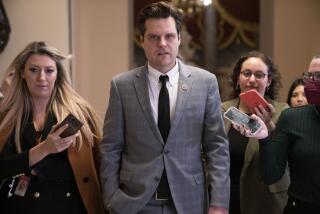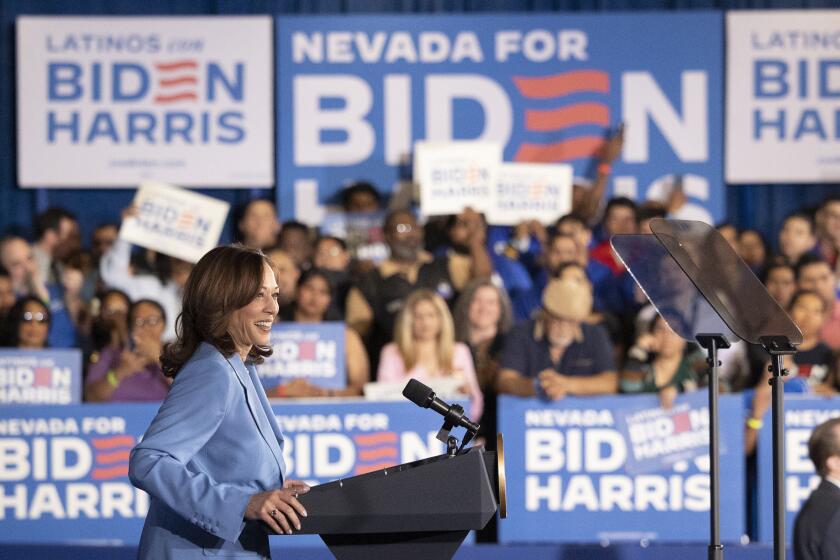John Edwards not guilty on 1 count, mistrial declared in other 5
GREENSBORO, N.C. -- Former Democratic presidential candidate John Edwards was found not guilty Thursday on one of the six counts of campaign finance fraud against him. The jury deadlocked on the other counts, and the judge declared a mistrial.
U.S. District Judge Catherine Eagles had sent the jury of eight men and four women back to resume deliberations earlier in the afternoon after the foreman reported that jurors had reached a verdict on one count, but not the other five.
The jurors, already in their ninth day of deliberations, returned after 20 minutes.
The judge asked, “Would further deliberations have any reasonable chance of a unanimous decision on the other counts?”
The foreman replied, “No, your honor.”
Edwards, who was handed the foreman’s note before it was read by the clerk, showed no emotion upon doing so. When the verdict was announced, however, he smiled, then reached over and hugged his daughter Cate and his parents. He also gave a bear hug to his attorneys, saying, “Thank you, thank you all.”
Edwards’ father, Wallace Edwards, when asked how he felt, pointed to a big smile on his own face and said, “This says it all.” His mother, Bobbie Edwards, said: “We prayed for this, and God answered our prayers.”
The government now must decide whether to seek a new trial on the five counts for which a verdict was not reached.
The trial featured two main characters who were exposed in testimony as liars with tarnished reputations -- Edwards and his former aide, Andrew Young.
Edwards lied about his affair with Rielle Hunter and falsely denied that he fathered their daughter. The prosecution portrayed him as a manipulative politician who orchestrated payments totaling $925,000 from two wealthy benefactors to cover up the affair and thus save his campaign from collapsing in scandal.
Prosecutors built their case around Young, who testified under a grant of immunity. Young said Edwards solicited the payments, kept abreast of the scheme and even persuaded Young to falsely claim that he had fathered Hunter’s child. But testimony revealed that Young and his wife kept much of the money for themselves, and kept phony records to cover it up.
The money came from Rachel “Bunny” Mellon, 101, a billionaire heiress and ardent Edwards supporter, and from Fred Baron, a wealthy Texas lawyer who was Edwards’ campaign finance chairman. Baron died in 2008. Mellon, who has failing eyesight and hearing, was not called to testify.
In three weeks of testimony by 24 witnesses, prosecutors focused on the tawdry details of the affair and the attempts to keep it secret. Jurors heard salacious details of trysts between Edwards and Hunter, and descriptions of madcap trips across the country to hide a pregnant Hunter -- and later her daughter -- from pursuing National Enquirer reporters.
The case was unprecedented; no major political candidate has been charged with campaign finance corruption for attempts to hide a mistress. Hampton Dellinger, a North Carolina lawyer who has taught election law at Duke University and who attended the trial, said Edwards is the most prominent American lawyer put on trial since Clarence Darrow.
There was no smoking gun, no body, and not even a distinct crime scene. In fact, the defense argued that there was no crime at all -- only a philandering husband desperately trying to hide an affair from his wife.
Witnesses described how Mellon sent “Bunny money” checks to an interior decorator, Bryan Huffman, who endorsed them and sent them to Andrew Young. His wife, Cheri Young, then deposited the checks in the couple’s accounts, using her maiden name.
Jurors heard how some of the money from Baron was spent to support Hunter’s lavish lifestyle. With the Youngs and their small children in tow, Hunter was flown to expensive hotels and homes in exclusive neighborhoods in an attempt to escape tabloid reporters determined to expose the affair.
Edwards, 58, a former U.S. senator and 2004 vice presidential nominee, was charged with six counts of violating federal election laws. Prosecutors said he “knowingly and willingly” solicited the payments and knew they were illegal. One count charged Edwards with conspiring to accept the payments and to conceal them from the Federal Election Commission through “trick, scheme or device.”
The defense said the payments were private gifts intended to hide the affair from Edwards’ wife, Elizabeth Edwards. Witnesses testified that Elizabeth Edwards, who died of cancer in 2010, had become increasingly suspicious of her husband, monitoring his bank accounts and phone calls.
Edwards’ lawyers mounted a two-pronged defense. They attempted to discredit Young as an opportunist seeking revenge against his former boss. They tried to convince jurors that under federal election law the payments were private gifts not directly related to the campaign.
The chief financial officer for Edwards’ 2008 campaign, for instance, testified that the FEC did not require her to report the payments as campaign contributions -- even after Edwards was indicted last year. And a former FEC commissioner, Scott Thomas, testified that in his 37 years of experience with federal election laws, no one had been prosecuted for payments from a third party used to cover up an extramarital affair.
The defense accused prosecutors of distracting jurors from the essence of the case -- dull, dry campaign finance law -- with “salacious stories” of the affair and coverup. Defense lawyers conceded that Edwards was a philandering husband who lied to his wife and to the nation, but they insisted he broke no laws.
It was Young, not Edwards, who masterminded the scheme to solicit the money and hide Hunter, defense lawyers said.
They called only seven witnesses from an original list of 65, and spent little more than two days to present Edwards’ defense. Considerable testimony focused on how the Youngs siphoned off much of the payments for themselves, keeping a phony set of books designed to make it appear that all payments went to support Hunter.
Instead, the defense showed in hours of testimony from a financial expert that the Youngs used the money to build a $1.6-million mansion and to embark on vacations and shopping sprees. Andrew Young even spent $35,000 on porcelain veneers for his teeth.
“They could shame Bonnie and Clyde,” defense attorney Abbe Lowell told the jury, referring to the Youngs.
Prosecutors responded by saying Young was the “perfect fall guy” for a scheming Edwards, and that the hapless Young had been “thrown under the bus” by his boss after years as a loyal aide.
“And the Greyhound, folks, has been rolling through this courtroom for weeks,” lead prosecutor David Harbach told jurors.
After all the lurid testimony about Edwards’ secret love life and elaborate lies, the jury was instructed to focus on narrow points of campaign finance law.
U.S. District Court Judge Catherine Eagles told jurors that prosecutors did not have to prove that the sole purpose of the payments was to influence the election-- only that there was a “real purpose or an intended purpose” to do so.
In declaring that influencing the election was “a” purpose of the payments, rather than “the” purpose, Eagles interpreted the law in a way that helped prosecutors make their case. The defense had argued that the law says “the purpose of a campaign contribution is to influence election.”
“On the other hand,” Eagles instructed jurors, “if the donor would have made the gift or payment notwithstanding the election, it does not become a contribution merely because the gift or payment might have some impact on the election.”
Jurors seemed to focus on that point, asking to review more than 60 exhibits about the payments. In one handwritten note to Young in 2007, following embarrassing media reports about a $400 haircut Edwards charged as a campaign expense, Mellon asked that future bills for “haircuts, etc., that are a necessary and important part of his campaign” be sent to her.
“It is a way to help our friends without government restrictions,” Mellon wrote.
Prosecutors wound up their case with an August 2008 TV interview Edwards gave to ABC News. In court, Edwards watched himself lie on national TV, claiming the affair was brief and that he was not the father of Hunter’s baby.
The prosecution hoped jurors who watched Edwards lie would conclude that he was also lying when he said – in the interview and through his lawyers in court – that he did not know about the payments.
The defense sought to sever the link between what lead attorney Abbe Lowell called Edwards’ “bad marriage conduct” and his lies about the affair.
“This is a case that should define the difference between someone committing a wrong and committing a crime,” Lowell told the jury. “John Edwards has confessed his sins. He will serve a life sentence for those.”
ALSO:
On heels of Dharun Ravi verdict, 3 charged after teen’s suicide
Five Wives Vodka can get a seat at the bar in Utah, not in Idaho
Charges dismissed against Texas honor student jailed for truancy
More to Read
Get the L.A. Times Politics newsletter
Deeply reported insights into legislation, politics and policy from Sacramento, Washington and beyond. In your inbox three times per week.
You may occasionally receive promotional content from the Los Angeles Times.











